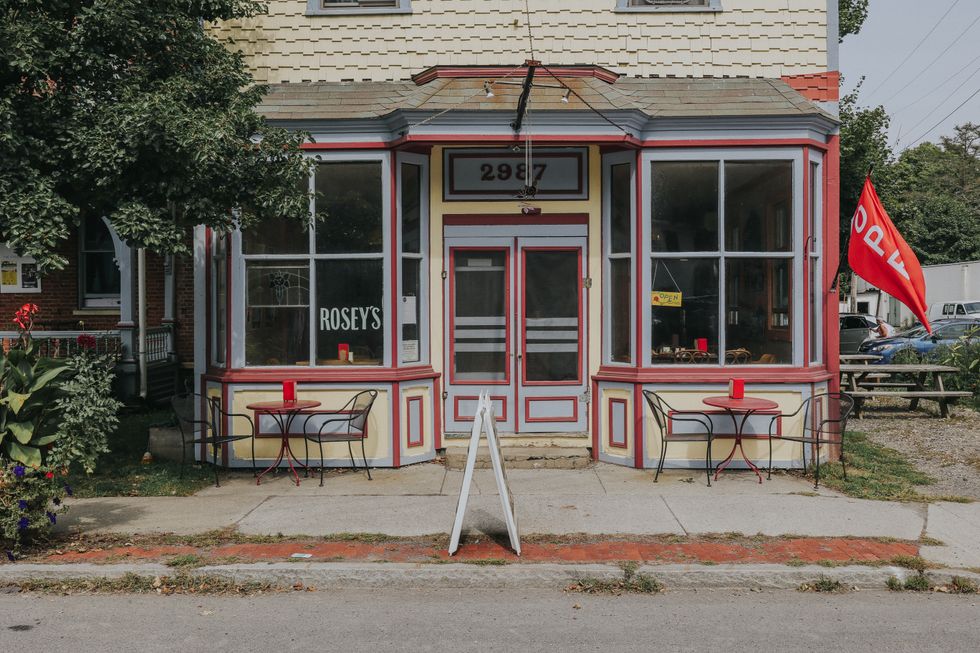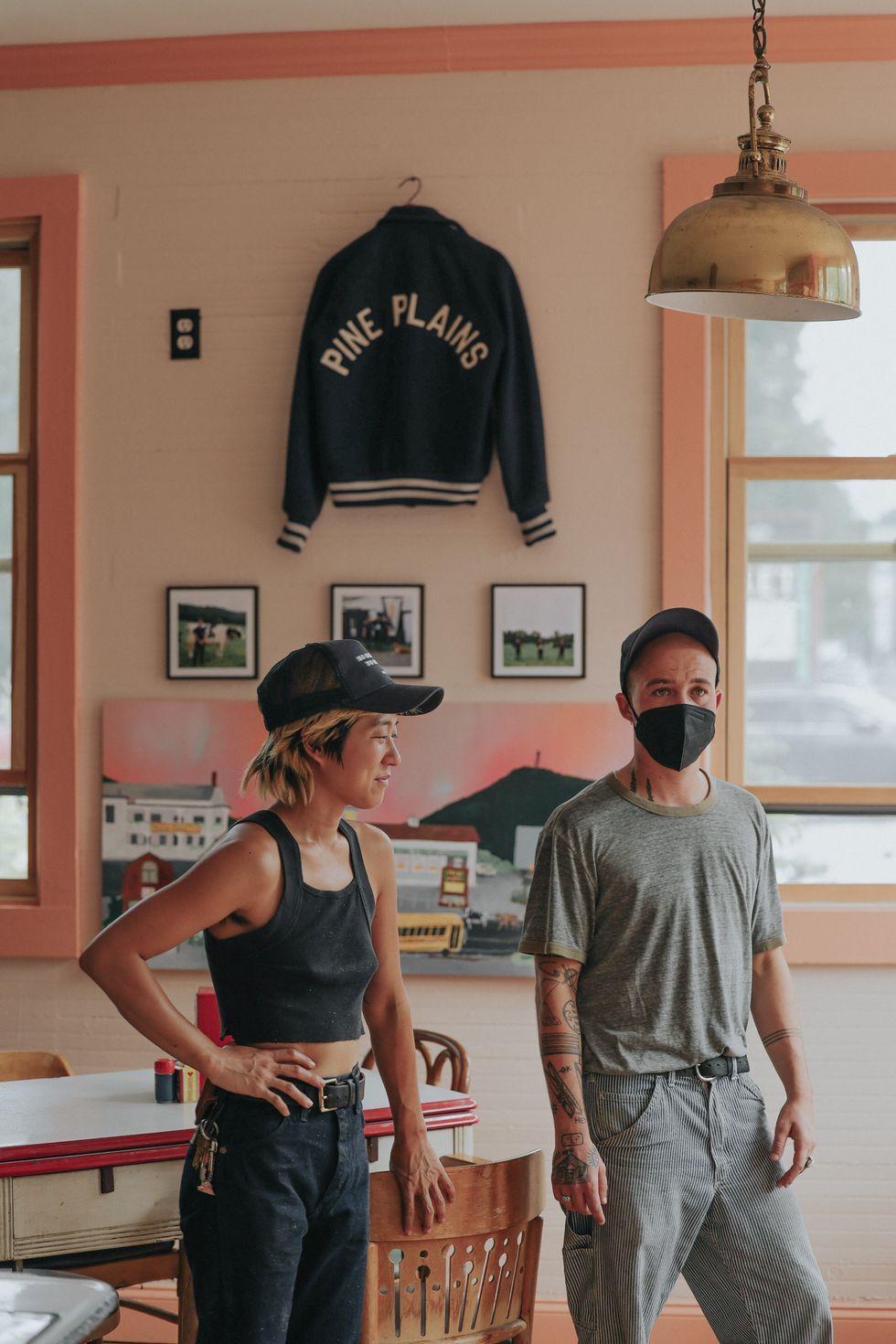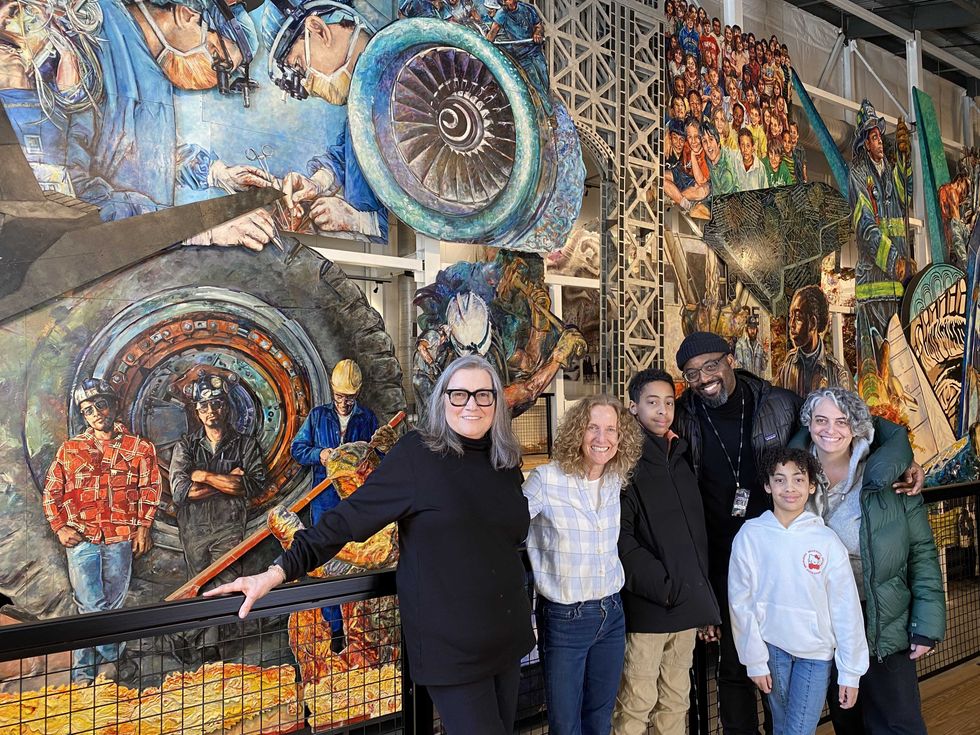It was ‘so good to see you’: Rosey’s to close Aug. 14

Rosey’s, at 2987 Church St. in Pine Plains, will close its doors on Monday, Aug. 14.
Photo by Matt Petricone

PINE PLAINS — Come Monday, Aug. 14, the residents of Pine Plains will have one fewer place to land for coffee, breakfast and lunch. Announced over Instagram on June 21, the closure of Rosey’s will end a run of just under three years.
Jamie Gerber, Rosey’s owner and manager, came to the decision to close shop for a variety of reasons, but chief among them was the impending departure of Rosey’s chef, Brit Ko. Ko is off to Rutgers to get a master’s degree in poetry, and to Gerber, the departure of a chef who is “such a creative and thoughtful cook” and who meshed so perfectly with Rosey’s fit and feel presented an opportunity for reevaluation. “There’s a part of me that thinks that I don’t want to work with anyone else,” said Gerber.
“It has been such a great adventure, and I’m very pleased to know so many more people in town, and feel involved in Pine Plains. But to be honest, I don’t totally enjoy running a business. If you want to make it as a business owner, you have to want to make money, and I’m not motivated by that.”
What Gerber has been motivated by is the community they’ve found in town and at Rosey’s. Gerber first moved to Pine Plains from New York City to work at Chaseholm Farm. They had little to no experience farming, but Sarah Chase, co-owner of Chaseholm with her brother Rory, was an old college friend and took a chance on Gerber.
“Chase took a big risk in taking me on, and it was truly a lifesaving gesture. … [She was] so incredibly generous, in terms of bringing me into her community,” Gerber said.
While at Chaseholm, Gerber began to operate a food cart that offered coffee and pastries. Customers were mostly neighbors and friends visiting Chaseholm’s farm store, and Gerber described that first venture as a way, in part, to “trick friends into visiting us at the farm.”
From that food cart, Gerber eventually built toward a business, and in October 2021, they signed a lease on the space at 2987 Church St., marking the beginning of Rosey’s. That decision to open a cafe/restaurant arose from Gerber’s love of sharing food with people, but also a desire to “create a space where my friends and neighbors could share food that was also grown by our friends and neighbors.” Indeed, a hallmark of Rosey’s menu has been a wide variety of food produced at Chaseholm, from farm-fresh eggs to tender pork—and Gerber gave full credit for the delicious dishes that arose therefrom to Ko and the kitchen staff.
But another element of Gerber’s decision to start Rosey’s had to do with Rosey’s namesake and its motto. The store is named for Sarah Chase’s mother, Rosey, with whom Gerber has developed a strong connection.
“Rosey and her twin sister, Tully, are always saying, ‘So good to see you.’ I love that spirit [of] I’m so glad to see you, I’m so glad to connect, I’m so glad you’re here. I’ve always felt very seen and loved by Rosey, and I wanted to cultivate a space that had that feeling to it.”
And while Gerber was able to build that atmosphere at Rosey’s, over time, the demands of running a business began to take a toll: “You’re always working, there aren’t really any days off. At the beginning, there literally were no days where I wasn’t there. It’s really hard to step away, have a boundary, not answer a phone call, do orders, answer an email.”
For that reason, plus continual staffing difficulties—an issue plaguing many businesses in the region—Gerber came to the decision to wrap up the Rosey’s chapter of their life. And by way of reflection on that chapter, Gerber had nothing but positive things to say.
“I feel unbelievably grateful for the friends and community that I’ve got here. People have been so kind and generous to us. Whether that was my friends who were sanding the floors for weeks on end, or our neighbors bringing us pastries every week. I have just been struck by people’s openness and generosity.”
In terms of what’s on the horizon for Gerber, they’re heading back to Chaseholm Farm to work with Sarah. And while what they’re looking forward to most at the moment is a bit of rest and distance from managing a business, they hope to continue to do catering, pop-up food events, and maybe even bring the food cart back to life. The biggest project for Gerber after Aug. 14, however, will be making peace with an ending, even if the journey itself was successful.
“We really want things that we love to last forever. But they don’t, and it’s okay that things end. It’s okay that things change. I’m really excited for the next folks that go into that space and get to try something out. And I’m really excited for Brit’s next adventure. But it’s bittersweet for sure.”

From left, chef Brit Ko and owner Jamie Gerber of Rosey’s in Pine Plains, which will close on Aug. 14. Photo by Matt Petricone
When longtime arts administrator Amy Wynn became the first executive director of the American Mural Project (AMP) in 2018, the nonprofit was part visionary art endeavor, part construction site and part experiment in collaboration.
Today, AMP stands as a fully realized arts destination, home to the world’s largest indoor collaborative artwork and a thriving hub for community engagement. Wynn’s departure, marked by her final day Oct. 31, closes a significant chapter in the organization’s evolution. Staff and supporters gathered the afternoon before to celebrate her tenure with stories, laughter and warm tributes.
“We had such a fun party for her,” said AMP founder and artistic director Ellen Griesedieck. “I am excited for what is next for Amy and grateful for every moment she has invested in her work at AMP.”
Wynn, who previously led the Northwest Connecticut Arts Council, said her decision to step down came after careful reflection.
“It’s time for me to shift into the next phase of my career, which will call upon my 40-plus years of nonprofit experience to do project work,” she said. “I’ve absolutely loved my time at AMP.”

Under Wynn’s leadership, AMP expanded education programs, deepened community partnerships and oversaw key milestones in the creation of its monumental centerpiece — a three-dimensional mural stretching 120 feet long and five stories high — celebrating American ingenuity, industry and collaboration.
“Through all these years, Amy has worked with tireless enthusiasm for AMP, running day-to-day operations and guiding the overall direction of our mission,” Griesedieck said.
During Wynn’s tenure, AMP evolved from a concept into a dynamic cultural campus. She helped professionalize its structure, solidify its funding base and develop programs that drew visitors from across the state and beyond.
“The work she has accomplished, the hours of overtime she has logged, the mountains we have climbed together since that moment are many and miraculous,” Griesedieck said.
AMP also weathered challenging times, including the pandemic, which forced arts organizations to rethink audience engagement. Wynn guided the team during that uncertain period with a steady hand.
To ensure a smooth transition, AMP has brought on Renee Chatelain of RMCreative Solutions, LLC, an experienced consultant, attorney and arts administrator who previously worked with AMP on its capital expansion planning.
Chatelain will serve as interim executive director while a national search is conducted for AMP’s next leader.
“A longtime friend, Renee comes to us with a depth of knowledge on executive transition,” said Griesedieck. “As an attorney, a leader of several arts organizations and a classically trained dancer, she is particularly well-suited for this interim role.”
Though stepping down, Wynn said she will continue her work in the nonprofit field in a more flexible, project-based capacity.
“I’ll be seeking consulting projects with other nonprofits, assisting with grant work and strategic planning,” she said. “What I enjoy most is leading a collaborative effort and finding solutions to challenging problems.”

Even as AMP bids farewell to Wynn, its focus remains on the future. The next phase of development will focus on converting a second mill building into expanded programming and community space.
“The next step has got to happen,” Griesedieck said. “It’s absolutely what the Northwest Corner needs — a place for the community to congregate.”
The proposed expansion would create flexible areas for performances, workshops and public events, further establishing AMP as a cornerstone of the regional arts scene.
With community support and grants, AMP hopes to carry forward Wynn’s momentum into a new era.
“She is not leaving,” Griesedieck said. “Amy will always be here for us.”
Founded in 2001, the American Mural Project was conceived as a tribute to the American worker — a celebration of skill, creativity and perseverance. The mural, the largest indoor collaborative artwork in the world, was created with contributions from thousands of children, artists, teachers, tradespeople and volunteers nationwide.
Today, AMP offers tours, workshops, lectures and performances, all rooted in its mission: to inspire, invite collaboration and reveal the contributions people of all ages can make to American culture.
As Wynn turns the page, her legacy — from her calm, strategic leadership to the collaborative spirit she fostered — remains woven into the fabric of AMP’s story.
The Norfolk Library will screen the acclaimed documentary “Kings of Pastry” on Friday, Nov. 14, at 7 p.m. The film will be introduced by its producer, Salisbury resident Flora Lazar, who will also take part in a Q&A following the screening.
Directed by legendary documentarians D.A. Pennebaker (“Don’t Look Back,” “Monterey Pop”) and Chris Hegedus (“The War Room”), “Kings of Pastry” offers a rare, behind-the-scenes look at the prestigious Meilleurs Ouvriers de France (Best Craftsmen of France) competition, a prestigious national award recognizing mastery across dozens of trades, from pastry to high technology. Pennebaker, who attended The Salisbury School, was a pioneer of cinéma vérité and received an honorary Academy Award for lifetime achievement.
Established in 1924 and overseen by the French Ministry of Labor, the competition challenges professionals to create a “masterpiece” that demonstrates skill, precision and artistry. Winners receive a lifelong title and medal, presented at a ceremony in Paris attended by the president of France.
In this documentary, 16 pastry chefs spend three grueling days in Lyon crafting delicate chocolates, towering sugar sculptures and exquisite pastries, all in pursuit of perfection — and the honor of being recognized by then-President Nicolas Sarkozy, as one of France’s best craftsmen. The filmmakers were granted exclusive access to capture this intense, emotional and visually stunning event.
Producer Flora Lazar came to filmmaking via an unexpected route. Trained as a historian and psychotherapist, she has had a lifelong love of French pastry, a passion she eventually pursued through formal training at a pastry school in Chicago.
“It was run like a military operation,” she recalled of the school. “You could eat off the floor. Everything had to be meticulous, precise.”
Lazar’s father, a first-generation Harvard graduate who grew up in the Borscht Belt, pushed his children toward high achievements in academia and “looked down on the trades,” Lazar admitted. “I loved French pastry my whole life,” she said. “But my dad wasn’t going to send me to pastry school.”
After her father’s passing — with her children grown and financial responsibilities eased — Lazar finally returned to that early passion.
At the pastry school in Chicago, Lazar met two chefs, one who had won and one competing for the Meilleurs Ouvriers title. Lazar set out to write an article about the competition and what it could mean for American education and industry.
Lazar, who knew Pennebaker and Hegedus from her years in New York, invited them to Chicago to meet the chefs. That meeting sparked the idea of “Kings of Pastry,” which was born.
For Lazar, though, the meaning has always been personal.
“The purpose of the film wasn’t just to show the high level of craftsmanship in French pastry but to illuminate a larger political, economic and educational issue.”
The screening will also serve as a promotion for the Norfolk Historical Society’s 11th Annual Cake Auction, to be held Dec. 6 at 5:30 p.m. Historical Society president Barry Webber will give a brief introduction to the auction before the film.
And yes, there will be cake.
Register for the event at norfolklibrary.org/events/documentary-
film-kings-of-pastry.
On Saturday, Nov. 15, the Stissing Center in Pine Plains will be host to the Hudson Valley premiere of the award-winning music documentary “Coming Home: The Guggenheim Grotto Back in Ireland.” The screening will be followed by an intimate acoustic set from Mick Lynch, one half of the beloved Irish folk duo The Guggenheim Grotto.
The film’s director, Will Chase, is an accomplished and recognizable actor with leading and supporting roles in “Law & Order,” “The Good Wife,” “Rescue Me,” “Nashville,” “The Deuce,” “Stranger Things” and “Dopesick.” After decades of acting on television and on Broadway, Chase decided to take the plunge into directing his own short films and documentaries.
In “Coming Home,” Chase follows one of his favorite bands, The Guggenheim Grotto, on a reunion tour in Ireland. Founding members Mick Lynch and Kevin May have not played together in more than a decade, and the reunion may also serve as a farewell tour for the band. The film captures not just the music, but the friendship and shared history between Lynch and May, set against the homeland that shaped their songs.
“I’m just a huge fan,” Chase said. “It’s a big 45-minute love letter to the guys. They really dive into why they didn’t make it as a band, whatever that means,” noting that many acclaimed musicians struggle to find mainstream recognition. “I look at them and they’re very successful. They were on television shows, they won some awards, but it also makes people go ‘Oh, right. There are other bands out there other than the ones that I just read about.’ There are all these wonderful artists that we don’t necessarily know about.”
Over the years, The Guggenheim Grotto earned major critical acclaim. Their 2005 debut album “Waltzing Alone” was hailed as “one of the most beautiful records of the year” by LA’s KCRW. An Independent Music Award followed in 2007 for best folk song/songwriting. The band grew quite popular in their native Ireland, but Lynch eventually moved to New York while May remained in Ireland. Though the band’s future seemed uncertain, there was always hope for a reunion of some kind.
Reflecting on his collaboration with the band, Chase said, “I was very fortunate and thanked them profusely for being so open and honest in the documentary. No one had done this with them before, and thank God they’re just affable, funny, great guys. They really love the piece. I think it touched them in very different ways.”
Immediately following the screening, Mick Lynch — one half of The Guggenheim Grotto and current Hudson Valley resident — will take the stage for an intimate acoustic set. The documentary, coupled with the live performance, offers a rare chance to see and hear what goes into the making of great music, art, and film.
Tickets are available at thestissingcenter.org
Ulysses Quartet
Music Mountain is partnering with Wethersfield Estate & Garden in Amenia to present the acclaimed Ulysses Quartet, joined by clarinetist and Music Mountain artistic director Oskar Espina Ruiz. The performances, on Saturday and Sunday, Nov. 15 and 16, will open Music Mountain’s Winter Concert Series — an extension of the beloved summer festival into the colder months and more intimate venues.
The program features Seth Grosshandler’s “Dances for String Quartet,” Thomas Adès’s “Alchymia for Clarinet Quintet,” and Mendelssohn’s String Quartet in E Minor, Op. 44, No. 2. Adès’s 2021 composition draws inspiration from Elizabethan London. Each movement is “woven from four threads,” writes the composer with titles that refer to Shakespeare’s “The Tempest,” John Dowland’s lute-song “Lachrymae,” variations on the playwright Frank Wedekind’s “Lautenlied” and more.
Praised for their “otherworldly magic” (The Millbrook Independent), the Ulysses Quartet brings a remarkable chemistry to the stage, one honed through years of international accolades and residencies. Espina Ruiz, known for his “tender warmth” and “rhapsodic ease” on clarinet, will join the quartet for Adès’s modern masterwork.
The Carriage House at Wethersfield, with its singular acoustics and historic charm, offers an ideal setting for this blend of heritage and innovation. A reception with the artists will follow each performance.
Tickets are available at wethersfield.org or by calling (845) 373-8037. Doors open at 2:30 p.m. Performances at 3 p.m.